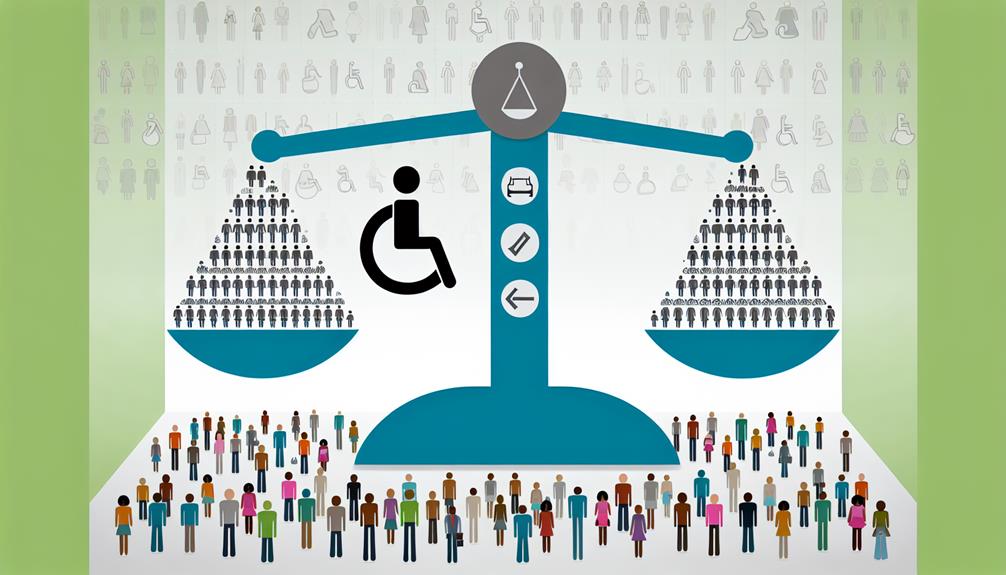Finding the best life insurance for people with disabilities is essential for securing financial stability. You can qualify for coverage despite your disability, as insurers cannot discriminate due to the Americans with Disabilities Act. Term life insurance is often a great choice, providing affordable rates and flexible terms. Permanent policies can offer lifelong protection and cash value benefits, while guaranteed issue policies provide coverage without medical exams. Be transparent about your medical history to avoid issues with claims. If you're keen for more details about specific providers and their offerings, the next steps will guide you further.
Key Takeaways
- Transamerica offers flexible underwriting and competitive rates, making it a solid choice for individuals with disabilities seeking life insurance.
- Prudential provides strong term life insurance options tailored to the unique circumstances of applicants with disabilities.
- Mutual of Omaha specializes in whole life coverage with guaranteed acceptance, ideal for those with pre-existing conditions.
- Consider guaranteed issue policies, which ensure coverage without medical exams, though they may have higher premiums.
- Collaborate with an insurance agent experienced in disability needs to navigate coverage options effectively.
Eligibility for Life Insurance
Many adults with disabilities are eligible for life insurance, proving that having a disability doesn't automatically disqualify you from coverage. Eligibility is determined through a thorough evaluation, which considers factors like your age, medical history, lifestyle, and the specific nature of your disability. It's important to disclose all relevant information about your condition during the application process, as failure to do so can lead to denied coverage or claims.
Insurers must comply with the Americans with Disabilities Act, ensuring that they don't discriminate against you based solely on your disability. However, they'll also assess how your disability impacts your life expectancy, which can influence both the approval of your application and your premium rates. For example, if your disability affects your overall health greatly, insurers may adjust your premium rates accordingly.
Understanding these eligibility criteria can empower you as you seek life insurance options. By being informed and transparent about your situation, you can find a policy that meets your needs, offering both financial security and peace of mind for you and your loved ones.
Application Process Overview
When you apply for life insurance, the process is generally the same for everyone, including those with disabilities. It's essential to provide full disclosure about your medical history and disability, as failing to do so can lead to serious consequences. Insurers evaluate your application based on various risk factors, so be prepared to share thorough information to avoid complications later on.
Application Consistency Across Applicants
Steering through the life insurance application process can feel overwhelming, but understanding its consistency across all applicants, including those with disabilities, is essential. Insurance companies consider various risk factors such as age, medical history, and health status to evaluate your application fairly. Here's what you need to keep in mind:
- Full Disclosure: Be upfront about any disabilities, as this impacts underwriting decisions and your overall risk profile.
- Documentation: You may need to provide documentation from healthcare providers to verify your health condition and disability status, which helps insurers assess your application accurately.
- Premium Rates: Your health status and medical history can affect the premium rates you receive, so it's crucial to understand how your disability affects your overall qualification for life insurance.
Importance of Full Disclosure
Full disclosure during the life insurance application process is essential for guaranteeing that you receive the coverage you need without any hiccups. When applying, it's critical to provide accurate information about your disabilities. This transparency helps insurers make informed underwriting decisions and affects your premium rates and eligibility for coverage.
Here's a quick overview of the importance of full disclosure:
| Aspect | Details |
|---|---|
| Accurate Information | Required for risk assessment |
| Underwriting Decisions | Influenced by disclosed disabilities |
| Premium Rates | Can be affected by the level of risk presented |
| Policy Termination | Possible if misrepresentation occurs |
| Claims Denial | Can result from failure to disclose relevant medical history |
Non-disclosure might lead to serious consequences, including policy termination or denied claims. It's essential to provide specific details, including medical history and documentation from healthcare providers, to avoid being classified as committing life insurance fraud. Always prioritize transparency to facilitate smoother processing and favorable outcomes in your application.
Risk Assessment Factors Considered
Understanding how insurers assess risk is essential for anyone applying for life insurance, especially individuals with disabilities. The risk assessment process is thorough and goes beyond just your disability status. Here are three key factors insurers consider:
- Medical History: You'll need to provide detailed information about your medical history, including any chronic illnesses. This helps insurers gauge your overall health and potential life expectancy.
- Lifestyle and Occupation: Your daily habits and job can impact risk levels. Insurers look at how these factors affect your health and eligibility for coverage.
- Functional Abilities: They may require medical exams or attending physician statements (APS) to verify how your disabilities affect your daily living.
Insurers focus on transparent communication during the application process, so be open about your conditions. Chronic illnesses that greatly impact your life expectancy might lead to higher premium rates, while well-managed disabilities could qualify you for better rates. Understanding these risk assessment factors can help you navigate the application process more effectively and improve your chances of finding suitable life insurance coverage.
Impact of Disability on Premiums

The impact of a disability on life insurance premiums can vary widely depending on several factors. Insurers assess the increased risk associated with chronic health conditions when determining your premiums. If you have a well-managed disability, you might retain stable premiums, but recent or severe disabilities can complicate risk assessment and potentially raise your rates.
Insurers closely evaluate your daily functioning and the overall impact of your disabilities on your health, as these factors directly influence your life expectancy. Full transparency about your health conditions during the application process can expedite approvals and may even lead to more favorable premium rates. Misrepresentation can backfire, resulting in higher costs or denial of coverage.
It's essential to understand that the impact of specific disabilities on premiums varies considerably based on your individual health circumstances, lifestyle choices, and the insurer's underwriting criteria. By being open and honest, you not only secure financial protection for your loved ones but also help insurers accurately gauge the risk they're taking. Ultimately, this transparency can lead to better outcomes for your life insurance premiums.
Types of Life Insurance Policies
When considering life insurance, you'll encounter several types of policies tailored to different needs. Term life insurance offers a budget-friendly way to secure coverage for a specific period, while permanent life insurance provides lifelong protection and cash value. Additionally, guaranteed issue policies cater to those with health concerns, ensuring you can obtain coverage without medical exams.
Term Life Insurance Options
Finding the right term life insurance can provide peace of mind for individuals with disabilities, offering coverage for a specific period, like 10, 20, or 30 years. This type of policy is often chosen for its affordability and straightforward structure, making it accessible for those seeking financial protection.
Here are three key points to take into account when exploring term life insurance options:
- Qualification: Despite potential challenges, many disabled individuals can still qualify for traditional term life policies. However, severe disabilities may impact your underwriting criteria, which could lead to higher premium payments.
- Constant Premiums: Rates for term life insurance typically remain constant throughout the selected term. This guarantees predictable costs, helping you budget without worrying about unexpected increases.
- Conversion Options: Some term policies allow for conversion to permanent coverage without requiring a medical exam. This flexibility means you can secure lifelong protection as your needs evolve.
Permanent Life Insurance Benefits
Exploring permanent life insurance benefits can be a game-changer for individuals with disabilities seeking long-term financial security. This type of insurance provides lifelong coverage, ensuring your beneficiaries receive a death benefit no matter when you pass away. With a whole life insurance policy, you'll enjoy fixed premiums and guaranteed cash value growth, offering a stable investment along with your insurance coverage.
Universal life insurance is another option, allowing for flexible premiums and adjustable death benefits. This adaptability means you can tailor your coverage to meet changing financial needs over time. For individuals with disabilities, permanent life insurance is particularly beneficial, as it secures financial support for dependents throughout their lives, ensuring ongoing care and stability.
Many permanent life insurance policies come with riders, which can provide additional benefits specifically designed for people with disabilities. These enhancements can further increase your financial protection and support, addressing your unique needs. In your financial planning, exploring these coverage options can help you create a safety net for yourself and your loved ones, making permanent life insurance an essential consideration for your future.
Guaranteed Issue Policies Explained
For individuals with disabilities, managing life insurance options can be challenging, but guaranteed issue policies offer a straightforward solution. Unlike traditional life insurance, these policies don't require medical exams or health questions, making them more accessible. Here's what you should know:
- Coverage Amounts: Guaranteed issue life policies typically provide coverage ranging from $5,000 to $25,000. This amount can often cover final expenses or funeral costs effectively.
- Higher Premiums: Since these policies lack medical underwriting, they usually come with higher premiums compared to traditional life insurance. The increased risk for insurers translates into higher costs for you.
- Graded Death Benefits: Be aware that guaranteed issue policies often feature graded death benefits. If you pass away within the first few years, your beneficiaries may only receive a return of premiums paid plus interest, rather than the full death benefit.
Always compare different insurance providers to find the best terms and costs for your guaranteed issue life insurance. This way, you can guarantee you're making the right choice for your needs and those of your beneficiaries.
Importance of Disability Disclosure

Disclosing your disability during the life insurance application process is vital for securing coverage and avoiding complications down the line. Insurance companies require accurate health information, including details about your medical history, to assess risk and determine premium rates. By practicing full disability disclosure, you guarantee that the underwriting process runs smoothly and that you receive the coverage you need.
Transparency is key; if you misrepresent your disability, you risk policy termination or coverage denial later on. It's important to understand that failure to disclose your condition can be classified as life insurance fraud, leading to denied claims when your beneficiaries need support the most. For those on Social Security Disability Insurance (SSDI), revealing your disability status can greatly impact your policy options and costs.
Tips for Securing Coverage
Maneuvering the life insurance landscape can be intimidating, especially for individuals with disabilities. However, with the right approach, you can secure coverage that meets your needs. Here are some tips to help you navigate the process:
- Work with an Insurance Agent: Collaborate with an experienced life insurance agent who understands the unique needs of applicants with disabilities. They can guide you through your coverage options effectively.
- Be Transparent About Your Medical History: Full disclosure about your medical history and disability can lead to a smoother underwriting process. This transparency may even result in lower premium rates.
- Explore Guaranteed and Simplified Issue Policies: These types of life insurance often don't require medical exams and can provide coverage for individuals with complicated health histories.
Additionally, maintain and improve your overall health by following medical treatment recommendations. Good health can positively influence your risk assessment and insurance premiums. Finally, take the time to research and compare different insurers, as underwriting criteria and premium rates can vary greatly, helping you find the best coverage options tailored to your circumstances.
Best Life Insurance Companies

Finding the right life insurance company can make all the difference for individuals with disabilities seeking coverage. Among the top contenders, Transamerica stands out as the best overall choice due to its flexible underwriting and competitive rates. If you're looking for strong term life insurance offerings tailored to your unique circumstances, Prudential is an excellent option you should consider.
For those interested in whole life coverage, Mutual of Omaha specializes in this area and offers guaranteed acceptance, making it ideal for individuals with complex health histories. When you want to compare different insurers and discover various life insurance options, Policygenius serves as a valuable resource, helping you navigate the market with ease.
Lastly, Fidelity Life deserves mention for its commitment to making life insurance accessible and affordable. They focus on innovative products that cater specifically to individuals with disabilities, ensuring you find suitable coverage. By exploring these life insurance companies, you'll be better equipped to secure the disability insurance you need, whether it's term life insurance or whole life solutions tailored to your needs.
Frequently Asked Questions
How Does a Disabled Person Get Life Insurance?
To get life insurance, start by researching different insurers and their policies. You'll need to provide full disclosure about your health and any disabilities. Consider contacting an experienced life insurance agent who can guide you through the process and help you find suitable options. Look into specialized policies that might not require medical exams, but be aware they could have higher premiums and limited coverage compared to traditional options.
What Insurance Is Best for Disability?
Did you know that nearly 1 in 4 Americans will experience a disability during their working years? When considering insurance for disability, it's vital to look for policies that guarantee financial stability. Short-term disability insurance can replace a portion of your income during recovery, while long-term policies provide extended support. You should also explore riders that enhance coverage, like the disability income rider, to make sure you're fully protected in case of unexpected events.
How Much Life Insurance Can You Have on Disability?
The amount of life insurance you can have while on disability varies based on your individual health and financial situation. Insurers often offer coverage ranging from $5,000 to several million dollars, depending on your needs and obligations. However, premiums may be higher due to the nature of your disability. It's wise to consult with an experienced insurance agent who can help you navigate options that align with your financial goals and circumstances.
Can SSI Recipients Get Life Insurance?
Did you know that nearly 8 million Americans receive SSI benefits? If you're one of them, you can get life insurance without losing your benefits. Life insurance isn't typically counted as an asset for SSI eligibility, as long as the cash value stays under certain limits. Guaranteed issue policies are a great option since they don't require a medical exam. Just remember to disclose any policies during your SSI application to avoid penalties!
Conclusion
In summary, securing life insurance with a disability can be challenging, but it's certainly possible. Did you know that over 20% of Americans live with some form of disability? This highlights the importance of finding coverage that meets your needs. By understanding eligibility, being transparent during the application process, and exploring different policy types, you can find the right insurance. Don't let misconceptions hold you back; take the steps needed to protect your future and loved ones.
